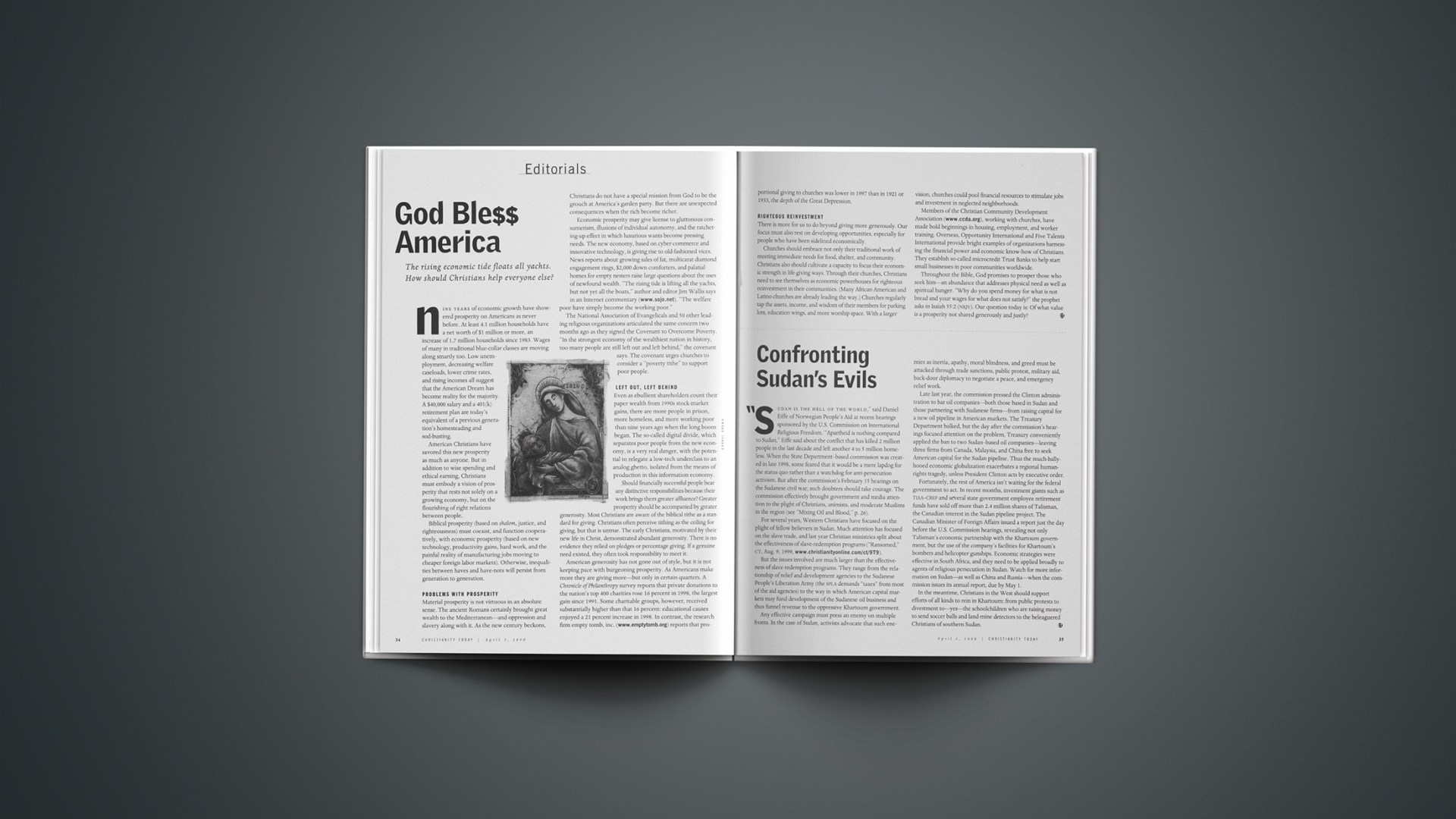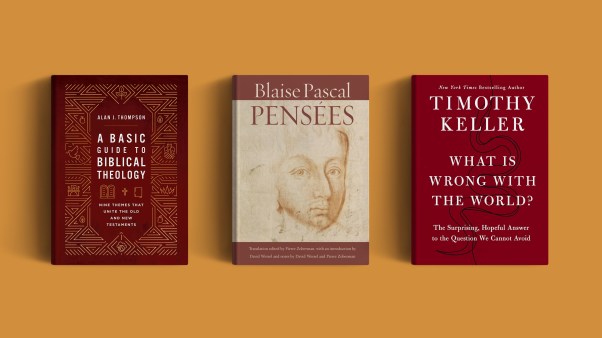Nine years of economic growth have showered prosperity on Americans as never before. At least 4.1 million households have a net worth of $1 million or more, an increase of 1.7 million households since 1983. Wages of many in traditional blue-collar classes are moving along smartly too. Low unemployment, decreasing welfare caseloads, lower crime rates, and rising incomes all suggest that the American Dream has become reality for the majority. A $40,000 salary and a 401(k) retirement plan are today's equivalent of a previous generation's homesteading and sod-busting.

American Christians have savored this new prosperity as much as anyone. But in addition to wise spending and ethical earning, Christians must embody a vision of prosperity that rests not solely on a growing economy, but on the flourishing of right relations between people.
Biblical prosperity (based on shalom, justice, and righteousness) must coexist, and function cooperatively, with economic prosperity (based on new technology, productivity gains, hard work, and the painful reality of manufacturing jobs moving to cheaper foreign labor markets). Otherwise, inequalities between haves and have-nots will persist from generation to generation.
PROBLEMS WITH PROSPERITY
Material prosperity is not virtuous in an absolute sense. The ancient Romans certainly brought great wealth to the Mediterranean—and oppression and slavery along with it. As the new century beckons, Christians do not have a special mission from God to be the grouch at America's garden party. But there are unexpected consequences when the rich become richer.
Economic prosperity may give license to gluttonous consumerism, illusions of individual autonomy, and the ratcheting-up effect in which luxurious wants become pressing needs. The new economy, based on cyber-commerce and innovative technology, is giving rise to old-fashioned vices. News reports about growing sales of fat, multicarat diamond engagement rings, $2,000 down comforters, and palatial homes for empty nesters raise large questions about the uses of newfound wealth. "The rising tide is lifting all the yachts, but not yet all the boats," author and editor Jim Wallis says in an Internet commentary. "The welfare poor have simply become the working poor."
The National Association of Evangelicals and 50 other leading religious organizations articulated the same concern two months ago as they signed the Covenant to Overcome Poverty. "In the strongest economy of the wealthiest nation in history, too many people are still left out and left behind," the covenant says. The covenant urges churches to consider a "poverty tithe" to support poor people.
LEFT OUT, LEFT BEHIND
Even as ebullient shareholders count their paper wealth from 1990s stock-market gains, there are more people in prison, more homeless, and more working poor than nine years ago when the long boom began. The so-called digital divide, which separates poor people from the new economy, is a very real danger, with the potential to relegate a low-tech underclass to an analog ghetto, isolated from the means of production in this information economy.
Should financially successful people bear any distinctive responsibilities because their work brings them greater affluence? Greater prosperity should be accompanied by greater generosity. Most Christians are aware of the biblical tithe as a standard for giving. Christians often perceive tithing as the ceiling for giving, but that is untrue. The early Christians, motivated by their new life in Christ, demonstrated abundant generosity. There is no evidence they relied on pledges or percentage giving. If a genuine need existed, they often took responsibility to meet it.
American generosity has not gone out of style, but it is not keeping pace with burgeoning prosperity. As Americans make more they are giving more—but only in certain quarters. A Chronicle of Philanthropy survey reports that private donations to the nation's top 400 charities rose 16 percent in 1998, the largest gain since 1991. Some charitable groups, however, received substantially higher than that 16 percent: educational causes enjoyed a 21 percent increase in 1998. In contrast, the research firm empty tomb, inc. reports that proportional giving to churches was lower in 1997 than in 1921 or 1933, the depth of the Great Depression.
RIGHTEOUS REINVESTMENT
There is more for us to do beyond giving more generously. Our focus must also rest on developing opportunities, especially for people who have been sidelined economically.
Churches should embrace not only their traditional work of meeting immediate needs for food, shelter, and community. Christians also should cultivate a capacity to focus their economic strength in life-giving ways. Through their churches, Christians need to see themselves as economic powerhouses for righteous reinvestment in their communities. (Many African-American and Latino churches are already leading the way.) Churches regularly tap the assets, income, and wisdom of their members for parking lots, education wings, and more worship space. With a larger vision, churches could pool financial resources to stimulate jobs and investment in neglected neighborhoods.
Members of the Christian Community Development Association, working with churches, have made bold beginnings in housing, employment, and worker training. Overseas, Opportunity International and Five Talents International provide bright examples of organizations harnessing the financial power and economic know-how of Christians. They establish so-called microcredit Trust Banks to help start small businesses in poor communities worldwide.
Throughout the Bible, God promises to prosper those who seek him—an abundance that addresses physical need as well as spiritual hunger. "Why do you spend money for what is not bread and your wages for what does not satisfy?" the prophet asks in Isaiah 55:2 (NKJV). Our question today is: Of what value is a prosperity not shared generously and justly?
Related Elsewhere
Jim Wallis's Sojourners Internet commentary on "prosperity for some" is available at sojo.net
Many of the statistics from empty tomb, inc.'s study on proportional giving are available at the firm's Web site.
The Christian Community Development Association's site has information about its member organizations, a youth site, information about community development, and other resources.
Copyright © 2000 Christianity Today. Click for reprint information.











